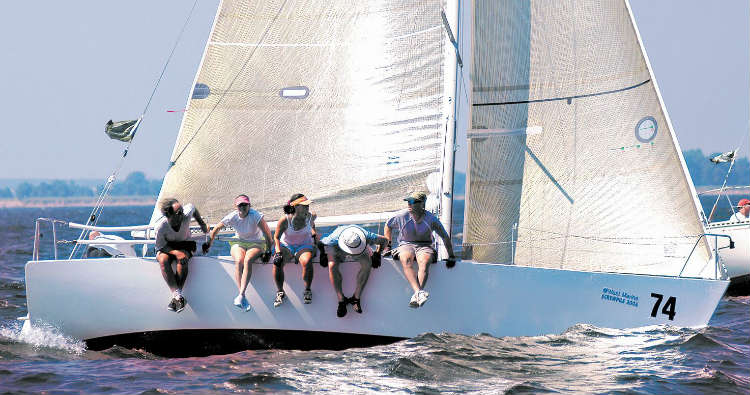While skimming a 10-year-old issue of SpinSheet, we found this Throwback Thursday article "Crew Prep 2007" that still held up quite well today! You'll recognize a few skippers' names, a few boat changes, and some pretty solid advice! Enjoy!
Flip flops and daffodils—it’s spring on the Chesapeake Bay. If racing is your thing, you’re counting down the Wednesdays, circling the date of your first weeknight race or big regatta, and feeling the itch to get back out there. You’re ready.
Are you really ready? Seasoned skippers might argue that there’s some work to be done before you are prepared to sail well. According to a number of successful Bay skippers, as they launch their programs, attitude checks may be as important as gear checks. Making sure that your crew is tuned up physically and mentally is as crucial as practicing mark-roundings.
According to John Edwards, skipper of Rhumb Punch, a very competitive J/29 sailing out of Solomons, successful crew preparation starts with crew selection. Attitude can trump experience on his boat. “One caustic personality can ruin a regatta,” he says. In order to ensure that his crew gels, he has them help prepare the boat. “Do not expect your crew to do your dirty work in the depths of winter, but include as many as possible for waxing and finishing touches before launching,” he says. “You can sense the beginnings of a bonding or a problem before the boat even gets wet. Everyone gets the feeling they have contributed to the boat’s success.”
Erik Wulff starts the season by getting his Endorphin (B/H 36) crew together at a pub to discuss their schedule, goals, and crew alignment. He remarks, “You have to do this on an organized basis if you want to come on strong at the beginning of the season.” Once out on the water, the best thing Wulff does to organize his crew is to avoid telling them what to do whenever possible. He explains, “You have to let them take charge and ‘own’ what they’re doing.”
Skipper of Sure Cure (Elite 32) and crew for numerous highly competitive race boats, Craig Decker says, “I think a crew that eats breakfast together sails well together. On my boat, we have eggs and bacon at the house before we leave the dock. I have a breakfast time and a dock time. It is hard to race and be very physical and mental if you are hungry.”
Decker races the Florida circuit in the winter, and mental preparation is crucial to the team’s success. “We are required to be in town and ready to practice for three full days before the first race day. When we hit the dock, it is full on racing, no conference calls, no FedEx, full focus on racing.” He tells a “weak link” story about a crew member on another boat and how his heavy drinking ruined the next race day for him and his crew. “If you are racing, you need to take care of yourself, eat right, sleep enough, and carry your weight.”
Other crews only wish they had a full three days of practice before the first race. Odyssey skipper and 2006 High Point winner David Shiff says that in the ideal world, “The crew would all show up. We’d practice a bunch and have the same people at all of the races.” In the real world, a number of crew members have had to tend to their families and taper off their racing commitments. This year is one of crew turnover for him, but he’s calm. With a good tactician and bowman, “I can fudge it,” he says. His aim is to get his crew out once or twice to practice before the first weekend regatta. “We do a few douses and gybes and hope that everyone remembers what they’re doing on the race course.”
Skippers agree that the most useful practice drills are going around buoys (or crab pots) to replicate the upwind and downwind transitions of racing and to recreate a start line if possible. After his Rhumb Punch crew’s initial practice when he has good settings recorded, Edwards claims, “The most important crew training possible is before the first start of each race day. Get to the course early, sail upwind at least a mile, and set a chute. Usually there is a lunch break at a championship, and we sail upwind at least halfway to the top mark and set a chute.”
Crew feedback is important to Edwards. “I constantly seek input from the crew, and we rotate positions in the middle of the boat to gain an understanding of each crew member’s role.” One of the keys to his success has been having a “steady stream of information” from the rail. He says, “Developing crew is developing an information machine that keeps the boat on a lifted tack and going fast.”
Problem Child skipper and 2006 High Point winner Brian Jones avoids crew “drills,” favoring a lighthearted, fun atmosphere in which practice maneuvers come naturally. “I try to juggle a mix of crew chemistry so that everyone enjoys racing with one another.
The right people on board don’t harp on issues. They accept each other’s differences and work together as a group of friends to achieve the common goal: fun and success on the race course.”
Fun and success—that is what it’s all about. Ready or not, here we come.





